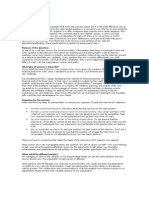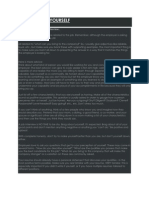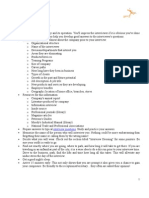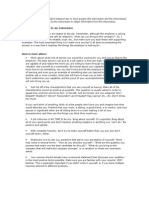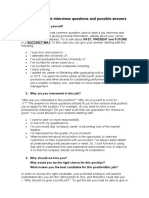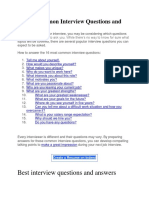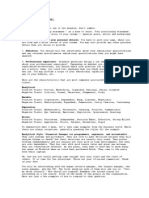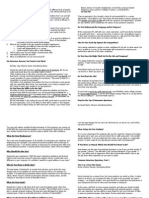Tips For Interview
Tips For Interview
Uploaded by
Roni AnarhoCopyright:
Available Formats
Tips For Interview
Tips For Interview
Uploaded by
Roni AnarhoOriginal Title
Copyright
Available Formats
Share this document
Did you find this document useful?
Is this content inappropriate?
Copyright:
Available Formats
Tips For Interview
Tips For Interview
Uploaded by
Roni AnarhoCopyright:
Available Formats
Special Tips
The rule is that not the best qualified candidates get job. Your on-site performance plays a big role. Here are some easily forgettable points.
90% interviewing questions raised based on your own resume. eye-to-eye contact, smiling all the way. don't miss anyone in the corner. asking easier and relevant questions back to the interviewers occasionally. be honest to answer technical questions, you are not expert to know everything. don't let your boss feel you might be a threat to take his position. don't be critical, focus on what you can do. try to be humor to show your smartness. don't act in a superior way. find right time to raise questions AND answer those questions to show your strength. aggressively to get candidacy info back after interviewing.
Job Interview Special Tips
The following questions are unrelated with Java technology, but they may be asked. So study this list, plan your answers ahead of time and you'll be ready to deliver them with confidence. Note: most of questions and answers are cited from email box or donated by the people who experienced. They are listed here for your reference. Javacamp.org will not be responsible for any job loss or damage by using these tips. 1. What Are Your Weaknesses? This is the most dreaded question of all. Handle it by minimizing your weakness and emphasizing your strengths. Stay away from personal qualities and concentrate on professional traits: "I am always working on improving my communication skills to be a more effective presenter. I recently joined Toastmasters.com, which I find very helpful."
2. Why Should We Hire You? Summarize your experiences: "With five years' experience working in this industry and my proven record of saving the company money, I could make a big difference in your company. I'm confident I would be a great addition to your team."
3. Why Do You Want to Work Here?
The interviewer is listening for an answer that indicates you've given this some thought and are not sending out resumes just because there is an opening. For example, "I've selected key companies whose mission statements are in line with my values, where I know I could be excited about what the company does, and this company is very high on my list of desirable choices."
4. What Are Your Goals? Sometimes it's best to talk about short-term and intermediate goals rather than locking yourself into the distant future. For example, "My immediate goal is to get a job in a growth-oriented company. My long-term goal will depend on where the company goes. I hope to eventually grow into a position of responsibility."
5. Why Did You Leave (Are You Leaving) Your Job? If you're unemployed, state your reason for leaving in a positive context: "I managed to survive two rounds of corporate downsizing, but the third round was a 20 percent reduction in the workforce, which included me." If you are employed, focus on what you want in your next job: "After two years, I made the decision to look for a company that is team-focused, where I can add my experience."
6. When Were You Most Satisfied in Your Job? The interviewer wants to know what motivates you. If you can relate an example of a job or project when you were excited, the interviewer will get an idea of your preferences. "I was very satisfied in my last job, because I worked directly with the customers and their problems; that is an important part of the job for me."
7. What Can You Do for Us That Other Candidates Can't? or 8. What makes you unique? This will take an assessment of your experiences, skills and traits. Summarize concisely: "I have a unique combination of strong technical skills, and the ability to build strong customer relationships. This allows me to use my knowledge and break down information to be more user-friendly."
9. What Are Three Positive Things Your Last Boss Would Say About You?
It's time to pull out your old performance appraisals and boss's quotes. This is a great way to brag about yourself through someone else's words: "My boss has told me that I am the best designer he has ever had. He knows he can rely on me, and he likes my sense of humor."
10. What Salary Are You Seeking? It is to your advantage if the employer tells you the range first. Prepare by knowing the going rate in your area, and your bottom line or walk-away point. One possible answer would be: "I am sure when the time comes, we can agree on a reasonable amount. In what range do you typically pay someone with my background?"
11. If You Were an Animal, Which One Would You Want to Be? Interviewers use this type of psychological question to see if you can think quickly. If you answer "a bunny," you will make a soft, passive impression. If you answer "a lion," you will be seen as aggressive. What type of personality would it take to get the job done? What impression do you want to make?
12. Why do you like to join us? Be honest to answer such question. Sample answer would be: Because I like your company, etc. and I am capable of doing a good job. Or I just move to this area and I am looking for the job that suits me very well...
13. How did you handle your most challenging experience in your previous job? Smoothly, generally speaking. But I am a good team work player and always share my experience with others and learn from others.
14. Tell me about yourself? I'm a quick learner, dedicated, hard working and friendly employee.
15. Common Mistakes in Job Interview Poor personal appearance.
o o o o o o o o o o o o o o o o o o o o o o o o o o o o o o o o o
Lack of interest and enthusiasm: Passive and indifferent. Over emphasis on money: interested only in best dollar offer. Condemnation of past employers. Failure to look at the interviewer when conversing. Limp, fishy handshake. Unwillingness to go where sent. Late to interview. Failure to express appreciation for interviewer's time. Asks no questions about job. Indefinite response to questions. Overbearing, over aggressive, conceited with superiority or "know it all complex." Inability to express self clearly: Poor voice diction, grammar. Lack of planning for career: no purpose and goals. Lack of confidence and poise: nervous ill at ease. Failure to participate in activities. Unwilling to start at the bottom-expects too much too soon. Makes excuses, evasive, hedges on unfavorable factors in record. Lack of tact. Lack of courtesy: ill mannered. Lack of Maturity. Lack of vitality. Indecision. Sloppy application blank. Merely shopping around. Wants job for short time. No interest in company or industry. Low moral standards. Cynical. Lazy. Intolerant: strong prejudices. Narrow interests. Inability to take criticism. High pressure type.
16. Here are some other job interview questions you might want to rehearse. Your Qualifications
o o o o o
What can you do for us that someone else can't do? What qualifications do you have that relate to the position? What new skills or capabilities have you developed recently? Give me an example from a previous job where you've shown initiative. What have been your greatest accomplishments recently?
o o o o
What is important to you in a job? What motivates you in your work? What have you been doing since your last job? What qualities do you find important in a coworker?
Your Career Goals
o o o o o o o o o
What would you like to being doing five years from now? How will you judge yourself successful? How will you achieve success? What type of position are you interested in? How will this job fit in your career plans? What do you expect from this job? Do you have a location preference? Can you travel? What hours can you work? When could you start?
Your Work Experience
o o o o o o
What have you learned from your past jobs? What were your biggest responsibilities? What specific skills acquired or used in previous jobs relate to this position? How does your previous experience relate to this position? What did you like most/least about your last job? Whom may we contact for references?
Your Education
o o o o
How do you think your education has prepared you for this position? What were your favorite classes/activities at school? Why did you choose your major? Do you plan to continue your education?
17. What have I forgotten to ask? Use this as a chance to summarize your good characteristics and attributes and how they may be used to benefit the organization. Convince the interviewer that you understand the job requirements and that you can succeed.
18. What salary are you expecting?
You probably don't want to answer this one directly. Instead, deflect the question back to the interviewer by saying something like: "I don't know. What are you planning on paying the best candidate?" Let the employer make the first offer. However, it is still important to know what the current salary range is for the profession. Find salary surveys at the library or on the Internet, and check the classifieds to see what comparable jobs in your area are paying. This information can help you negotiate compensation once the employer makes an offer.
19. "What are your hobbies?" and "Do you play any sports?" The interviewer may be looking for evidence of your job skills outside of your professional experience. For example, hobbies such as chess or bridge demonstrate analytical skills. Reading, music, and painting are creative hobbies. Individual sports show determination and stamina, while group sport activities may indicate you are comfortable working as part of a team. Also, the interviewer might simply be curious as to whether you have a life outside of work. Employees who have creative or athletic outlets for their stress are often healthier, happier and more productive.
20. "What are your career goals?" or "What are your future plans?" The interviewer wants to know if your plans and the company's goals are compatible. Let him know that you are ambitious enough to plan ahead. Talk about your desire to learn more and improve your performance, and be specific as possible about how you will meet the goals you have set for yourself.
21. Do you prefer to work by yourself or with others? The ideal answer is one of flexibility. However, be honest. Give examples describing how you have worked in both situations.
22. What is your major weakness? Be positive; turn a weakness into a strength. For example, you might say: "I often worry too much over my work. Sometimes I work late to make sure the job is done well."
23. What are your best skills?
If you have sufficiently researched the organization, you should be able to imagine what skills the company values. List them, then give examples where you have demonstrated these skills.
24. Why did you leave your last job? The interviewer may want to know if you had any problems on your last job. If you did not have any problems, simply give a reason, such as: relocated away from job; company went out of business; laid off; temporary job; no possibility of advancement; wanted a job better suited to your skills. If you did have problems, be honest. Show that you can accept responsibility and learn from your mistakes. You should explain any problems you had (or still have) with an employer, but don't describe that employer in negative terms. Demonstrate that it was a learning experience that will not affect your future work.
25. "Why do you want to work here?" or "What about our company?" Few questions are more important than these, so it is important to answer them clearly and with enthusiasm. Show the interviewer your interest in the company. Share what you learned about the job, the company and the industry through your own research. Talk about how your professional skills will benefit the company. Unless you work in sales, your answer should never be simply: "money." The interviewer will wonder if you really care about the job.
26. Tell me about yourself. Make a short, organized statement of your education and professional achievements and professional goals. Then, briefly describe your qualifications for the job and the contributions you could make to the organization.
27. Do you prefer to work alone or in a group? It depends on the project or the task. I am comfortable working in a group as well as individually. Most of the times, the team effort brings the new and better concepts. However, there are some tasks that are effectively completed by one person. If I am trying to identify a production problem, one person can do it effectively. When some other person is looking over your shoulder, you do not do a good job.
28. Why should we hire you? I will be an asset to your organization. I'm loyal, persistent, motivated, and I learn fast. I am someone who could be very productive very quickly.
29. What is your favorite color? Purple
30. Why do you like the job? Because I think I have a best quality for that job. 31. Why should we hire you not others? You are recommended to focus on your qualification against the job requirements. If your job role is going to change, and you really know that others mean the people you know, you are recommended to sort out your strong points against others.
You might also like
- Common Job Interview QuestionsDocument4 pagesCommon Job Interview QuestionsRia NirwanaNo ratings yet
- TipsDocument6 pagesTipssachinsac1234No ratings yet
- Key Interview Questions and How To Answer ThemDocument5 pagesKey Interview Questions and How To Answer ThemBen AuNo ratings yet
- Job InterviewDocument13 pagesJob InterviewHajnal SzilasiNo ratings yet
- Succes Steps To InterviewDocument27 pagesSucces Steps To InterviewyashaspatelNo ratings yet
- Interview TipsDocument8 pagesInterview TipsAbhijit SavardekarNo ratings yet
- 10 Questions and Answers in A Job InterviewDocument4 pages10 Questions and Answers in A Job InterviewScribdTranslationsNo ratings yet
- 1Document3 pages1Spongebob SquarepantsNo ratings yet
- Some Important Interview Q & ADocument11 pagesSome Important Interview Q & AAhmer Salman Sheikh100% (1)
- Successfully Answer Traditional Questions in Your Job InterviewDocument3 pagesSuccessfully Answer Traditional Questions in Your Job InterviewinsightslecturasytalleresNo ratings yet
- Interview Skills-Student VersionDocument15 pagesInterview Skills-Student Versionberniece_agcaoiliNo ratings yet
- Interview QuestionsDocument5 pagesInterview QuestionsJeethu BachiNo ratings yet
- Mock Interviews 1Document3 pagesMock Interviews 1api-3558472390% (1)
- 12 Questions For Management and NonDocument9 pages12 Questions For Management and NonalkazumNo ratings yet
- 60 Top QuestionsDocument3 pages60 Top QuestionspbsrivinayNo ratings yet
- The Best Answers To Tough Interview Questions: 1. Tell Me About YourselfDocument35 pagesThe Best Answers To Tough Interview Questions: 1. Tell Me About YourselfhappyNo ratings yet
- "What Are Your Goals For The Future?" or "Where Do You See Yourself in Five Years?"Document13 pages"What Are Your Goals For The Future?" or "Where Do You See Yourself in Five Years?"Tang BinNo ratings yet
- Answers To 10 Most Common Job Interview QuestionsDocument3 pagesAnswers To 10 Most Common Job Interview QuestionsArjelyNo ratings yet
- Common Interview Questions 2Document20 pagesCommon Interview Questions 2divine.paraiso.mNo ratings yet
- 參加英語面試時的常見問題Document12 pages參加英語面試時的常見問題Eng4ChineseNo ratings yet
- Answers To 10 Most Common Job Interview QuestionsDocument3 pagesAnswers To 10 Most Common Job Interview QuestionsCorina Rotaru100% (1)
- Too Many Job Seekers Stumble Through Interviews As If The Questions Asked Are Coming Out of Left FieldDocument2 pagesToo Many Job Seekers Stumble Through Interviews As If The Questions Asked Are Coming Out of Left FieldSeemaNo ratings yet
- Tell Me About YourselfDocument10 pagesTell Me About YourselfYaasheeny RajandranNo ratings yet
- English Job InterviewDocument10 pagesEnglish Job InterviewAlex8mRNo ratings yet
- Interviewing TechniquesDocument2 pagesInterviewing TechniqueschbilalmNo ratings yet
- 15 Common Interview Questions and AnswersDocument5 pages15 Common Interview Questions and AnswersDorisz Hermné BalázsiNo ratings yet
- Interview SkillDocument20 pagesInterview SkillMeronNo ratings yet
- 10 Questions and Answers in A Job InterviewDocument6 pages10 Questions and Answers in A Job InterviewScribdTranslationsNo ratings yet
- Tell Me About YourselfDocument6 pagesTell Me About YourselfRahul JoshiNo ratings yet
- Interviewing Tips: Page 1 of 4Document4 pagesInterviewing Tips: Page 1 of 4Md Mafizul Islam ShrabonNo ratings yet
- Interview QuestionsDocument15 pagesInterview QuestionsPiyuesh GoyalNo ratings yet
- Interview Questions With Sample AnswersDocument5 pagesInterview Questions With Sample Answersmyrabel.03aligadoNo ratings yet
- Answers For Job InterviewDocument7 pagesAnswers For Job InterviewSanelynNo ratings yet
- English Phrases For A Job Interview: GreetingsDocument8 pagesEnglish Phrases For A Job Interview: GreetingsYasmin SchikorraNo ratings yet
- 15 Most Common Job Interview Questions and AnswersDocument7 pages15 Most Common Job Interview Questions and AnswersSYAFIQAH NAJIHAH KAMARUL EFFENDYNo ratings yet
- Ravi Singh Group Private Limited (Job Interview Question) PDFDocument14 pagesRavi Singh Group Private Limited (Job Interview Question) PDFravi singhNo ratings yet
- Frequently Asked HR QuestionsDocument22 pagesFrequently Asked HR QuestionsHarish JvNo ratings yet
- Interview Skills: The Winning EdgeDocument8 pagesInterview Skills: The Winning Edgerohitshetty84No ratings yet
- An 1Document29 pagesAn 1priyaasthanaNo ratings yet
- Green Light Interview TipsDocument4 pagesGreen Light Interview Tipsmm72600No ratings yet
- Most Common Job Interviews Questions and Possible AnswersDocument5 pagesMost Common Job Interviews Questions and Possible AnswersGabriela PerroniNo ratings yet
- Hrinterviewquestion-Interview Question-Phpapp01Document9 pagesHrinterviewquestion-Interview Question-Phpapp01Manoj KumarNo ratings yet
- Job InterviewDocument16 pagesJob InterviewThanh NgaNo ratings yet
- More Suggestions:: Here Are Examples Given by Wikianswers ContributorsDocument5 pagesMore Suggestions:: Here Are Examples Given by Wikianswers ContributorsNeeraj SajwanNo ratings yet
- Common Interview QuestionsDocument11 pagesCommon Interview Questionsjamz alcantaraNo ratings yet
- EPP InterviewQuestions TipsDocument5 pagesEPP InterviewQuestions TipsAbdul HaziqNo ratings yet
- The Most Difficult Questions You'll Be Asked On A Job InterviewDocument6 pagesThe Most Difficult Questions You'll Be Asked On A Job Interviewdiegoargentina100% (2)
- Interview Tips: Frequently Asked Questions in InterviewsDocument11 pagesInterview Tips: Frequently Asked Questions in InterviewsnajibNo ratings yet
- Interview QuestionsDocument10 pagesInterview QuestionsMunyambo Laurent0% (1)
- Job Applicant Interview ScriptDocument4 pagesJob Applicant Interview ScriptFundraising MOVeNo ratings yet
- The Interview ProcessDocument12 pagesThe Interview ProcessSimran KaurNo ratings yet
- The Best Way To Become An Asset To The Company Is by Consistently Going Beyond The Expectations To Which The Company Expects You To PerformDocument5 pagesThe Best Way To Become An Asset To The Company Is by Consistently Going Beyond The Expectations To Which The Company Expects You To PerformMay Nerissa Cruz CopiacoNo ratings yet
- At A Job InterviewDocument5 pagesAt A Job Interviewsilromer100% (1)
- Converting An InterviewDocument39 pagesConverting An InterviewKasturi MJNo ratings yet
- 50 Practice Interview QuestionsDocument8 pages50 Practice Interview QuestionsromarcambriNo ratings yet
- Prepare For InterviewsDocument14 pagesPrepare For InterviewsmecitfuturedreamsNo ratings yet
- Tell Me About YourselfDocument6 pagesTell Me About Yourselfcameoutourbody100% (2)
- Interview On GoodDocument10 pagesInterview On GooddomellamNo ratings yet
- Successful Job Interviews: Everything you need to win over recruitersFrom EverandSuccessful Job Interviews: Everything you need to win over recruitersRating: 3 out of 5 stars3/5 (1)






















